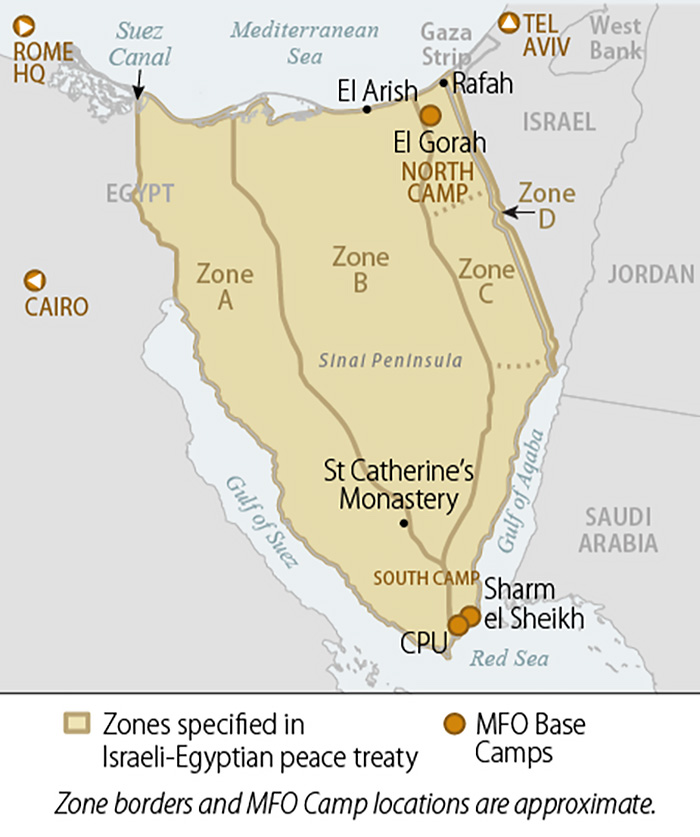MFO: Tipping the Scales in Favor of Stability
Reflections
BY JOSEPH ANTHONY D’AGOSTINO III
Forty-three years ago, the United Nations Security Force withdrew as peacekeepers from the Sinai Peninsula. At a meeting on Aug. 3, 1981, the United States, Egypt, and Israel formed the Multinational Force and Observers (MFO) to enforce the peace between Egypt and Israel, employing both military and civilian leaders to support diplomatic solutions to real and potential treaty violations.
A small but powerful organization, the MFO is important to U.S. power and influence throughout the region. Spread across Egypt and Israel, with its headquarters in Rome and the support of some 22 nations, MFO now consists of about 1,200 troops contributed by 15 nations and a civilian staff of about 160, drawn from many nations and including local Egyptians and Israelis. For two years, I was fortunate to be one of them.
Although I served quite a few years after its formation, I felt the MFO’s presence and history every day of my tour. Upon reflection now, as the Israel-Hamas conflict rages, severely testing Egypt-Israel relations and threatening regional security, I can’t help thinking that the MFO has an important role in finding a solution.
The Multinational Force and Observers helped build and continues to facilitate a practical relationship between Egyptian and Israeli leaders that has endured.
I departed Washington, D.C., on Feb. 15, 2020, for Sinai, Egypt. After a very long flight and a layover in Cairo, I looked out the plane window on the last leg of the trip to the amazing view—endless shades of orange sand, dark red mountain tops, and valleys cut deep into the earth.
Once the plane landed in Sharm el-Sheikh, and the door opened, walking into the desert heat felt like entering a sauna. Ancient Egyptian images covered the walls of the modern airport, and on the drive to camp, I admired the Peace Square sculpture with beautiful, broad dove wings, the symbol of peace.
I had arrived at my new home. Sharm has gotten some recognition over the years, for a deadly Islamist terror attack that killed 88 in 2005 and, more recently, for hosting the COP 27 climate change conference in 2022. But the real diplomatic significance of this little city is that it is home to MFO–South Camp. My role was to review and process potential treaty violations between Egypt and Israel, and I was ready to get started, armed with the Treaty of Peace and Protocol as my guide.
Each day I learned what it takes to be a peacekeeper and how building relationships—not just between Egypt and Israel, but with my international colleagues—is the key to successful diplomacy. I had never imagined myself discussing strategy over pizza with members of the Fijian Army or performing an observation mission in the Red Sea with the Italian Navy over a cup of coffee. I hadn’t envisioned bonding with Bedouin colleagues in the Sinai desert at a lamb and chicken zarb.
The individuals who make up the Force account for its success in maintaining peace between Egypt and Israel for more than four decades. Professional, dedicated, driven, energetic, and hardworking, they are all part of the same mission though their jobs may differ. Each member has their own expertise that helps them succeed and, in turn, accomplish the MFO goal.
In 2024 the MFO will have completed 1,000 verification missions and performed countless observation missions through the Strait of Tiran and all four treaty zones. Its ability to engage to ensure maintenance of the Treaty of Peace agreed to by Egypt and Israel in 1979 will also be tested to the maximum.
As the Israel-Hamas conflict rages, I can’t help thinking that the MFO has an important role in finding a solution.
The framework for the Treaty of Peace was laid out in 1978 as part of the Camp David Accords. Negotiations between U.S. President Jimmy Carter, Egypt’s President Muhammad Anwar al-Sadat, and Israel’s Prime Minister Menachem Begin took two weeks to complete.
The treaty was finally signed in 1979, establishing the number of soldiers, tanks, and other pieces of military equipment allowed in each treaty zone. The protocol specified the leadership and structure of the MFO.

The Sinai Peninsula.
U.S. Congressional Research Service
U.S. citizens hold several powerful leadership positions—including MFO director general (DG) and the deputy DG of Cairo and Tel Aviv, respectively. These are former U.S. government officials dedicated to Middle Eastern peace. Since the MFO is an independent international institution, these U.S. citizens work directly for the Force, based on the 1981 Protocol. The U.S. provides about one-third of the organization’s funding and roughly 500 troops.
Members of the important civilian observer unit tasked with navigating the Sinai Peninsula on treaty observation missions are Americans, usually retired military service members and including secondees from the State Department Civil and Foreign Service ranks. Besides verification missions, the U.S. role consists of frequent military training exercises and relationship-building through cultural and diplomatic ties.
The MFO helped build and continues to facilitate a practical relationship between Egyptian and Israeli leaders that has endured through ups and downs over the years as a kind of anchor of stability in the Middle East.
Broadening the scope for stability, Jordan normalized ties with Israel in 1994; and in 2020, as part of the U.S.-brokered Abraham Accords, the UAE became the third Arab nation to establish diplomatic relations with Israel, and three more followed.
While the Oct. 7 Hamas attack thoroughly upended Israel’s defense and security assumptions, some commentators suggest that Tel Aviv now has “the necessity and opportunity to evolve in the direction of a multilateral security framework,” and away from self-sufficiency and sovereignty in decision-making. This approach can be traced in part to the establishment of the MFO.
The MFO, of course, is not involved in enforcing a cease-fire; it is dedicated to enforcing a treaty agreed to by both sides. Though a formal resolution of the core Israel-Palestine conflict will be difficult to achieve, the existence and activity of the MFO in the meantime surely tip the scales in favor of stability and solutions.
I am proud to be a member.
When sharing or linking to FSJ articles online, which we welcome and encourage, please be sure to cite the magazine (The Foreign Service Journal) and the month and year of publication. Please check the permissions page for further details.



